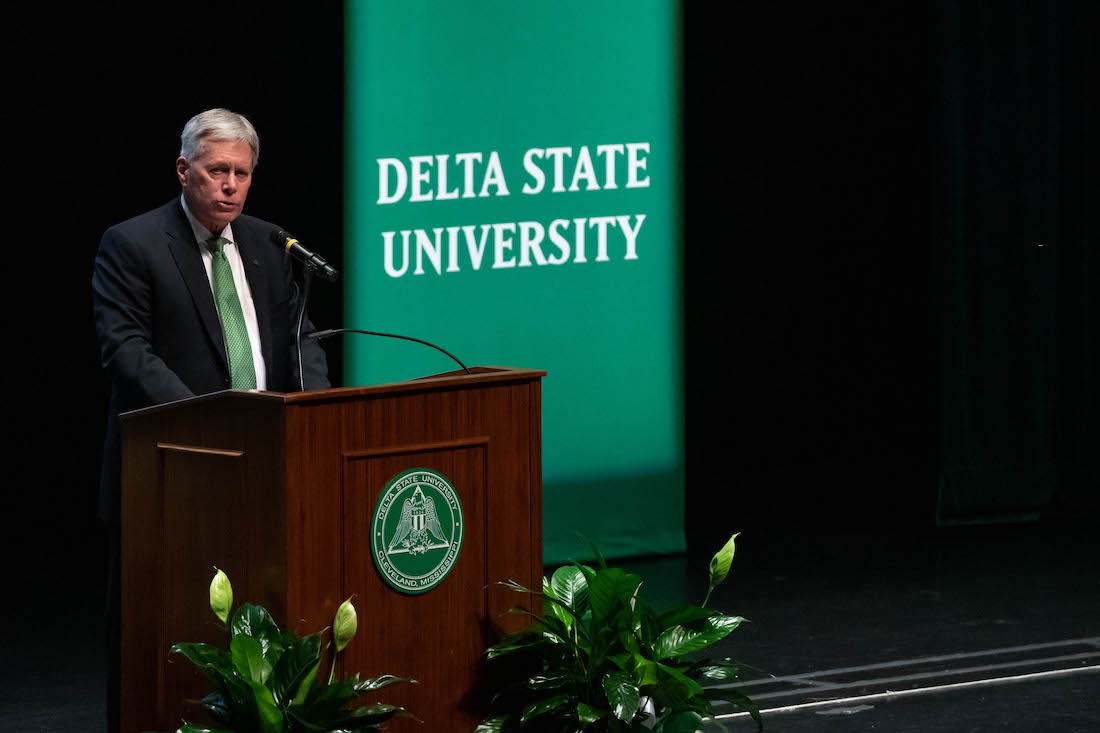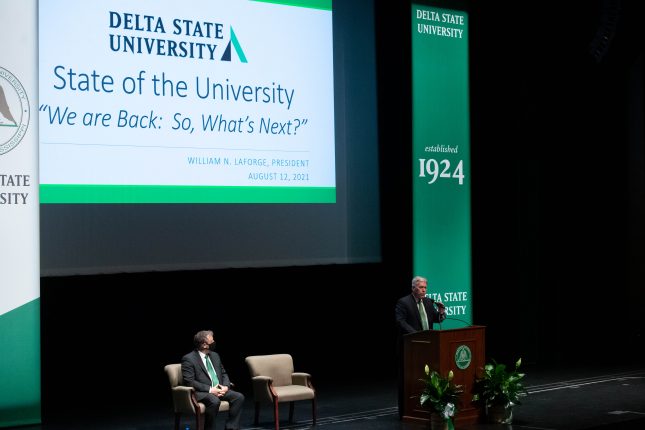 Delta State President William N. LaForge gives his State of the University Address during the Fall 2021 General Convocation,
Delta State President William N. LaForge gives his State of the University Address during the Fall 2021 General Convocation,CLEVELAND, Miss.— What’s next for Delta State University? If you ask President William N. LaForge, the vision for Delta State in 2027 includes coming off the heels of a successful centennial celebration that engaged and revigorated alumni and friends; a flourishing endowment that benefits an additional 400 students; the transformation of Ward Hall to the Delta State Honors College (used to accommodate a cohort of 60 high-achieving students), renovation of the Hugh White Stadium dormitory to the new Delta State Heritage, Cultural and Visitors Center, and more.
LaForge challenged faculty, staff, community members and friends of the University to think about their own vision for Delta State’s future during his State of the University Address, delivered virtually and in-person during the Fall 2021 General Convocation on Aug. 12.
Themed “We Are Back: So, What’s Next?”, LaForge’s address began by acknowledging the challenges of the previous year.
“What a whirlwind year we just experienced, full of challenges like we have never faced before,” he said. “The effects of the COVID-19 pandemic permeated throughout the academy and across campus in so many ways. We became a different university in many ways, and we learned how to play Hollywood Squares on Zoom.”
With the recent surge of the Delta variant, some of the “new normals” of the pandemic—like wearing face masks—will be around for the foreseeable future while other protocols have been relaxed from the past year.
“The basic state of play regarding COVID-19 response for Delta State —as well as for the other seven state universities —is simple: Until the Delta variant surge subsides, masks are required for all students, faculty, staff, and visitors while indoors on campus, including in classes, and this requirement applies whether individuals are vaccinated or unvaccinated,” he said.
Despite the challenges, the University still prospered in many ways; most importantly, it remained safe and healthy. LaForge noted that the University’s cash position is better than it was a year ago; its cash position increased by more than $2.5 million over last year; student debt receivables were reduced by more than $1 million dollars; and the budget is “robust” and “workable.”
In addition, LaForge said the Centennial Capital Fundraising Campaign for Delta State is in full swing and beyond the 60% mark towards its goal of $50 million.
“We are pleased that we could provide a two and a half percent pay raise to all full-time employees,” he continued, “and that we were also able to elevate the compensation level for equity and market reasons for 140 faculty and staff positions.”
Acknowledging the university’s enrollment challenges, due largely to the global pandemic, LaForge said that University has “doubled down” on its recruiting efforts.
“Our undergraduate and graduate admissions teams have worked very hard to help us return to pre-COVID numbers of students, and we are cautiously optimistic about an increase in fall enrollment,” he said.
Other 2020-2021 highlights include:
- Completion of the Sillers Coliseum re-roofing, HVAC system and upgrade to the lighting system, as well as completion of roofing projects for the Wright Art building and the Smith Facilities Management building;
- Major renovations of Lawler-Harkins, Cain-Tatum, and Fugler-Hammett residence halls;
- A major project to repair or replace all elevators on campus that is currently underway with an anticipated completion date of October;
- Completion of a new President’s Home;
- The College of Business and Aviation’s reaffirmation of the Bachelor of Commercial Aviation degree with the Aviation Accreditation Board International, and completed construction of the state-of-the-art Financial Investing and Research Lab;
- The College of Business and Aviation awarding of a $1,050,000, 2.5-year grant from the Kellogg Foundation to establish a Minority Women Business Center, and a $240,000 USDA grant to begin operations of the Business Assistance Center;
- The College of Education and Human Sciences gaining approval for two new Specialist programs that will begin Fall 2021—the Educational Specialist in Curriculum and Instruction and the Educational Specialist in Higher Education;
- The Counselor Education Program receiving full eight-year accreditation for its programs from the Council for the Accreditation of Counseling and Related Educational Programs (CACREP), and the Hamilton-White Child Development Center received full accreditation through 2026 from the National Association for the Education of Young Children (NAEYC);
- Delta State’s selection as one of nine new Japan Outreach Initiative (JOI) host sites by the Laurasian Institute for a fully-funded Japanese cultural educator who will be on campus next year;
- The Mississippi Delta National Heritage Area’s designation as the first of the 55 National Heritage Areas Congressionally-designated to be added to the African American Civil Rights Network;
- Delta State’s annual fundraising up $400,000 to $3.2 million with 500 more donors than the previous year. In addition, the University’s endowment increased 34% to $39 million thanks to a robust market;
- Both men’s and women’s swim/dive teams finishing in the top ten in the NCAA national meet, and two of Delta State’s women swimmers and two men swimmers won national championships;
- Delta State’s partnership with the Mississippi State Department of Health, Bolivar County, City of Cleveland, and the Bolivar Medical Center Foundation to host a drive-through COVID-19 vaccination site, which resulted in more than 2,200 people being fully vaccinated;
- A new system for the University’s scholarship program; and
- The reestablishment of the Coordinator of Diversity, Equity, and Inclusion position to facilitate the success of under-represented students and employees and coordinate the university’s diversity initiatives.

Looking ahead, LaForge pondered how the University could top its recent experience in terms of “out-of-the-ordinary” for a university enterprise.
“I know you share my excitement that we are back. And, now, we must ask, ‘what next?’” he said.
For starters, he acknowledged additions to Delta State’s leadership team with the new Provost and Vice President for Academic Affairs Dr. Andy Novobilski, and the new Vice President for Student Affairs Dr. Eddie Lovin.
“Both of our new Vice Presidents have hit the ground running and have been fully engaged in their respective portfolios and duties since July 1. They are terrific additions to our leadership team…They are already helping us to determine ‘what’s next’ for the university and providing us with leadership to new levels of excellence and success,” he said.
He then turned to the core mission and purpose of the University— teaching and students.
“It is my hope, and my charge to our faculty, that you are laser-focused on your field of inquiry and expertise as you confer knowledge and skills to your students,” LaForge said.
He continued, “The idea is to mentor and advise students, as we should, but stick to the script in your courses, and then, give them the extra ‘punch’ —if you choose to do so—outside the classroom.
“My guess and observation are that we do a pretty good job on this campus in this area of inquiry, but many universities around the country venture off track, and invite criticism from a cynical public — sometimes fair and sometimes not — that higher education is missing its designated mark and departing from its basic mission.”
Addressing students, LaForge explored the concept and culture of “safetyism,” a new term that argues that today’s young people are more sheltered than those from previous generations.
“I’m concerned that higher education, in some places — but hopefully not here — may be enabling recent and new generations of students to have an over-exaggerated sense of a need for ‘safety’ to protect themselves against ideas, free expression, and scholarly debate,” he said.
“It is important for us as a university to be firm in our resistance to increasing intolerance of opposing viewpoints or issues that simply make us — and our students — uncomfortable. We see far too much of that attitude in a large part of our society that refuses to distinguish facts and truth from myths and lies and seems to adopt as gospel that every issue lends itself to a binary narrative — good or bad; right or wrong; left or right; liberal or conservative.”
As a university, LaForge said that Delta State will continue to work against a culture of “safetyism” and encourage freedom of expression.
“Free play is what’s needed for growing children…let them have a little space and unsupervised time. And free time and speech and expression and movement to explore and learn, even occasionally at one’s peril perhaps, are what are needed at the college stage,” he said. “As a student, I certainly experienced that environment on this very campus, and I wish that for today’s students as well, just with a much higher level of technology and sophistication.”
While the future remains unknown, LaForge said the vision for tomorrow will reflect our actions today.
“With smart planning, continuing support from the state, a robust enrollment, generous alumni benefactors, and your engagement, every part of the dreamscape I described is possible. Together, let’s make that vision for tomorrow a reality starting today,” he said.
Click HERE to view a replay of LaForge’s full State of the University Address.

